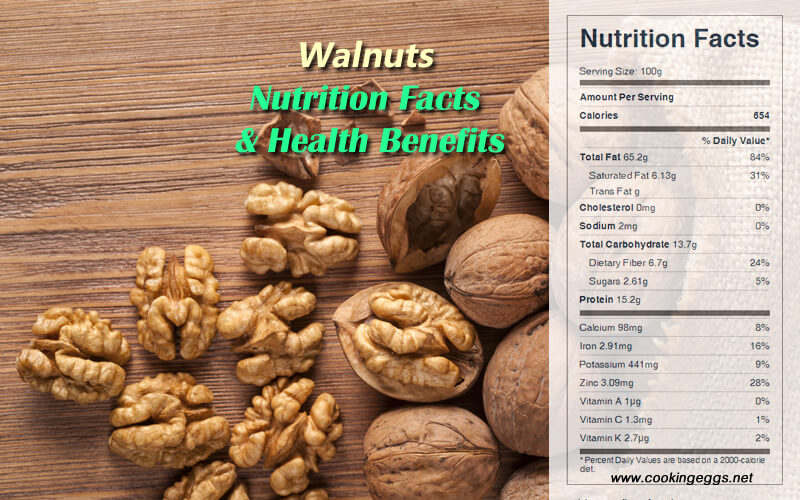Walnuts Nutrition Facts & Health Benefits
Walnuts are protein-rich, containing as much protein, weight for weight, as eggs. They are also high in potassium and other minerals, such as zinc and iron. Eat them in salads, where vitamin C-rich foods will help your body absorb these minerals.

Nutritional Composition of Walnuts
One ounce of walnut pieces provides 190 calories, 4 g carbohydrate, 4 g protein, 19 g fat, and 1 g dietary fiber.
Walnuts without shells are 4% water, 15% protein, 65% fat, and 14% carbohydrates, including 7% dietary fiber. In a 100-gram reference serving, walnuts provide rich content of several dietary minerals, particularly manganese, and B vitamins.
Unlike most nuts, which are high in monounsaturated fatty acids, walnut oil is composed largely of polyunsaturated fatty acids, particularly alpha-linolenic acid and linoleic acid, although it does contain oleic acid as 13% of total fats.
Walnuts Nutrition Facts Label
Health Benefits of Walnuts
Because walnuts resemble brains, they are commonly thought to support brain health. They are considered a good brain tonic and are used to treat head injuries in many cultures. Walnuts have a positive effect on our brain health, specifically helping to reduce those plaques that can develop in the brain and lead to Alzheimer’s disease.
Walnuts' anti-inflammatory and antioxidant properties are due to the polyphenol compounds found in them. When we think about neurogenerative diseases, such as Alzheimer’s disease, a key contributor to the disease is the development of amyloid beta protein plaques in the brain.
Amyloid beta protein increases the production of free radicals in the brain, leading to oxidative damage of the cell and resulting in cell death. Studies on the effect of walnut extract on amyloid beta proteins have found it reduces the amyloid beta mediated cell death, reduces cell damage and death, and decreases the production of reactive oxygen species. This protection of the brain is attributed to the ellagitannin and ellagic acid content in walnuts, as these compounds have demonstrated anti-inflammatory and antioxidant potential that could be responsible for the neuroprotective effect of walnuts.
Aside from the brain benefits, walnuts, like many nuts, are also known for their good fat content, which has healthpromoting effects. People who eat nuts regularly can enjoy a significant reduction in their risk of developing coronary heart disease. They’ll also reduce their risk of diabetes, cancer, and a host of other chronic ailments. One study that looked at all causes of death across various racial, gender, and age groups found an inverse ratio between nut consumption and all causes of mortality.
Walnuts are the flagship nut in this category. All nuts and seeds are significant contributors to your good health. It makes sense that nuts and seeds are rich sources of a wide variety of nutrients. One ounce of walnuts, or about 14 shelled walnut halves, provides the recommended daily value of omega-3 fatty acids, thereby contributing to cardiovascular protection, improved cognitive function, and anti-inflammatory benefits. Walnuts also provide ellagic acid, which is being investigated for its anticancer potential.
Walnuts are a superfood for a number of reasons. They are one of the few rich sources of plant-derived omega-3 fatty acids along with canola oil, ground flaxseed and flaxseed oil, soybeans and soybean oil, wheat germ, spinach, and purslane. They are rich in plant sterols—plant sterols can play a significant role in lowering serum cholesterol levels—a good source of fiber and protein, and they also provide magnesium, copper, folate, and vitamin E. Finally, they’re the nut with the highest overall antioxidant activity.
Walnuts also contain a variety of bioactive compounds, such as vitamin E and polyphenols. The main polyphenol that contributes to the uniqueness of walnuts is the polyphenol pedunculagin, which is an ellagitannin. After consumption, pedunculagin is hydrolyzed and releases ellagic acid, which is converted by our gut microbiota to urolithin A and B. Urolithin A and B are then synthesized in the colon and released into circulation to affect many target organs, the brain being one of them. They exhibit their protective effect by reducing inflammatory cytokines.
As with most nuts, walnuts’ high fat content renders them susceptible to rancidity. Store shelled walnuts in a sealed container in the refrigerator. They will be kept in the refrigerator for up to six months. In the freezer, they will keep for up to a year.